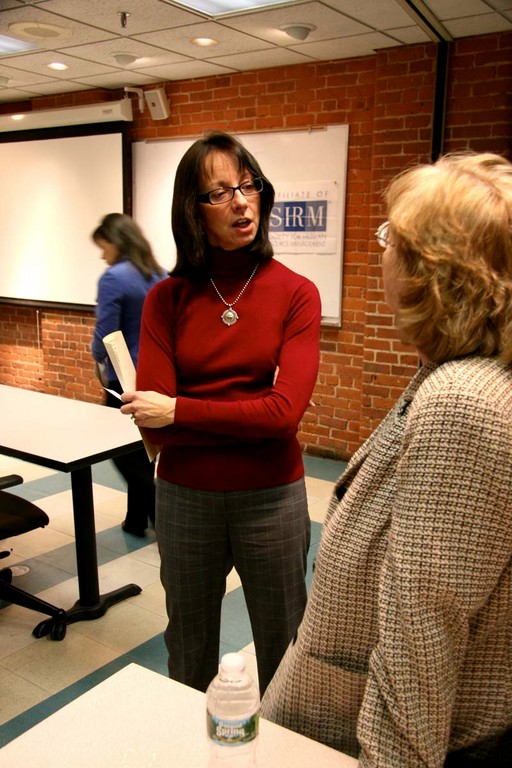
At Kahn, Litwin, Renza & Co., employee training has been one of the company’s strengths for years.
“We put a lot of emphasis on education and training,” said Alan Litwin, managing director of the certified public-accounting and business-consulting firm, which has offices in Boston, Newport, Providence and Waltham, Mass. “When we recruit for people to work here, we find that they are very career-oriented and want to work here. They want to have the opportunity to continue to learn and not just in technical areas either.”
Rapidly changing technology is transforming the workplace, requiring employees to learn new systems and increasing the need for skilled positions. That’s why there is a growing trend of companies investing in their workers, providing technical and personal training. Both parties profit in the arrangement, as employees are given the opportunity to develop professionally and personally and companies reap the benefits of better-educated workers.
In many cases turnover rates are reduced, a reflection that employees are happy – and more productive – at their job.
Kahn runs “KLR University,” an in-house training program that has a curriculum of 80 different courses. Some classes are technical while others, such as “Learning to Deal with Conflict,” have less to do with financial services.
Classes are offered from May to December because tax season is simply too busy. “We have a committee that decides the curriculum for the next calendar year, what the topics will be and who will teach them,” said June Landry, director of marketing. “We are constantly thriving to provide the education people are looking for in their own personal career development.”
Litwin said that it has been a very difficult hiring environment in the accounting industry, but he is confident the educational opportunity his company provides helps attract new employees. “We have excellent personnel retention and very little turnover,” he said.
Opportunity for personal advancement is also provided, as CPA test-preparation study groups are held and mentored by actual CPAs. A monthly tax roundtable is held to review new laws. The company also holds an annual summit, complete with guest speaker. Last year’s venue was Gillette Stadium, home of the New England Patriots.
Beside internal courses, the company provides full reimbursement for employees taking graduate-level courses in accounting. It also pays for employees to learn outside of the firm, attending conferences based on their interests, like the health care or hospitality industries. “We think the best way for people to develop professionally is to have a broad knowledge. We try to facilitate that and help provide it,” Litwin said.
On Jan. 9, the U.S Department of Commerce delivered a report to Congress evaluating the competitiveness and innovative capacity of the United States. Among its many topics, the report identified that research and education are critical for American economic competitiveness, business expansion and job creation. “Failures to properly invest in, and have comprehensive strategies for those areas have eroded America’s competitive position,” said one of the report’s conclusions.
At Taco Inc., in Cranston, Kyle A. Adamonis, senior vice president, explained the company has a strong focus on education. The company is a manufacturer of hydronic heating equipment, systems that use water to transfer heat. They also specialize in ventilation and air conditioning equipment for domestic, commercial and industrial applications.
Taco built its first learning center, inside its existing building, in 1992, at a cost of about $250,000. Occupying 2,000 square feet of their corporate headquarters, the center includes a library, two classrooms, a computer laboratory and a conference room.
“We took a different approach than most companies,” Adamonis said. “We want to educate the whole person; it wasn’t just about the business. We offer both work-related courses along with personal-development classes.” Courses include health and wellness, parenting, investing, gardening and art classes.
Technical classes cover a variety of subjects. With rapidly expanding computer systems the industry is in a constant state of change. Employees must be current with the latest trends and equipment
“We wanted employees to be trained, to keep up with new equipment and technological improvements we were using,” she said. Teachers may be in-house, university professors or paid professionals.
Last June, Taco began constructing a new innovation and development center for additional training, both for employees and the HVAC industry. The $18 million project will modernize the company’s Cranston facility. The project will create a two-story, 24,000-square-foot addition that will include classrooms and a business center. It is expected to be completed in late 2012.
Employing 400 people in Rhode Island and 80 in Massachusetts, Taco has a partnership with Roger Williams University’s School of Continuing Studies, which is teaching a technology, leadership and management degree program. About 25 employees are attending the course, which can count toward an associate or undergraduate degree. •












